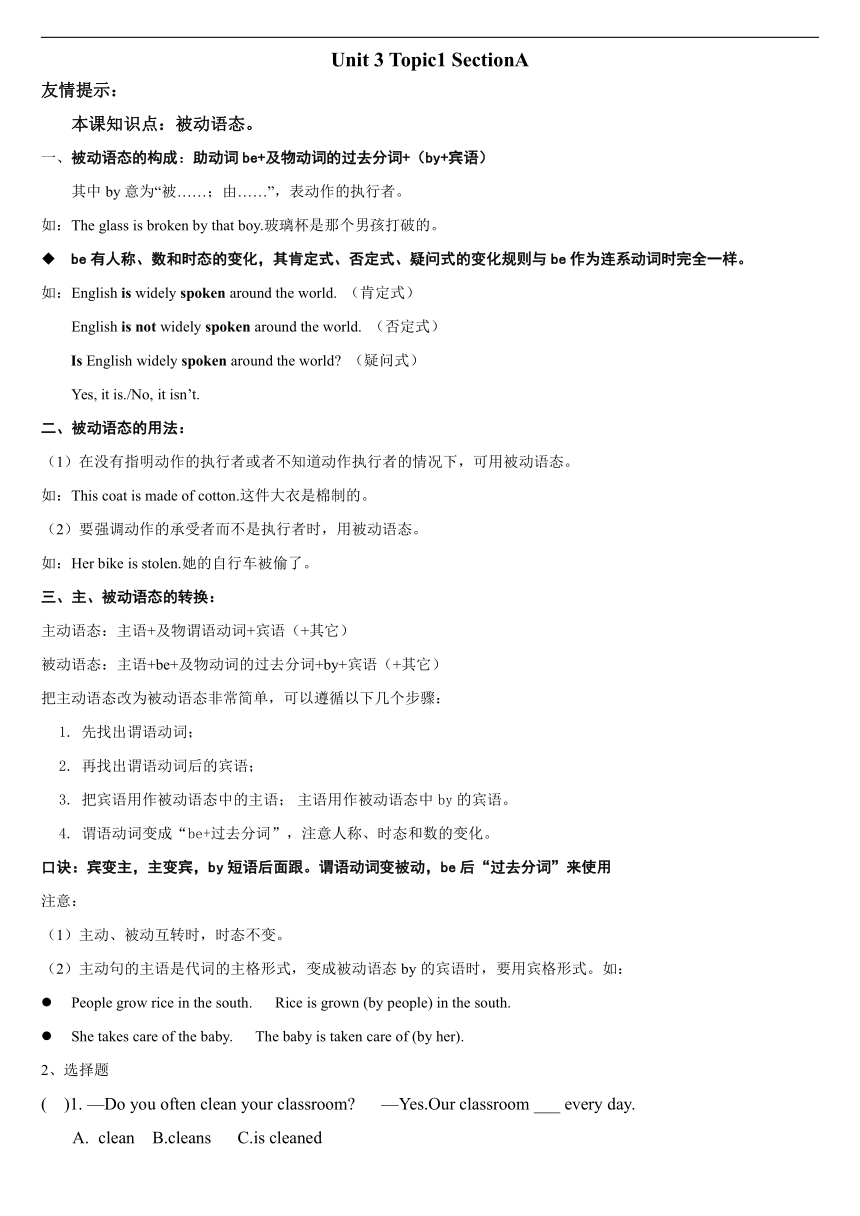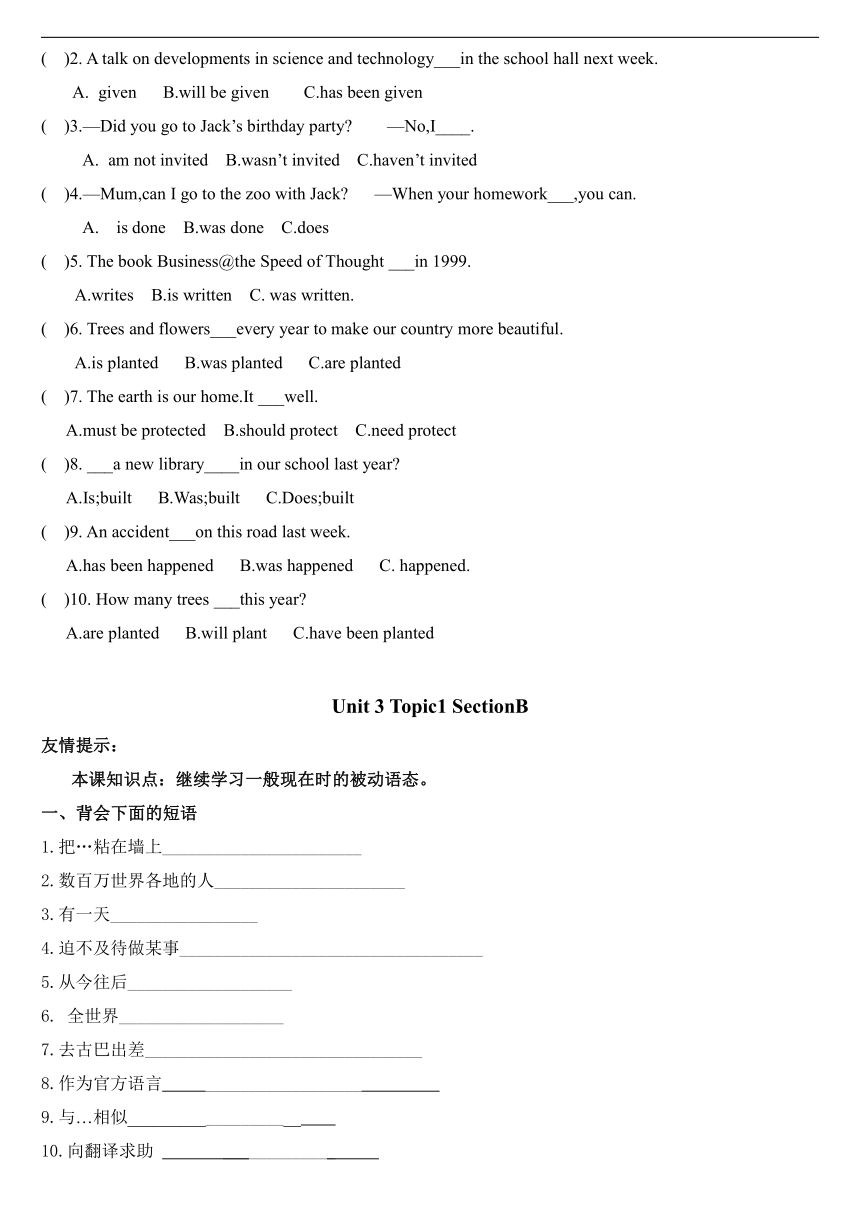仁爱版英语九年级上册 Unit 3 Topic1 English is widely used throughout the world 导学案(无答案)
文档属性
| 名称 | 仁爱版英语九年级上册 Unit 3 Topic1 English is widely used throughout the world 导学案(无答案) |

|
|
| 格式 | docx | ||
| 文件大小 | 27.1KB | ||
| 资源类型 | 教案 | ||
| 版本资源 | 仁爱科普版 | ||
| 科目 | 英语 | ||
| 更新时间 | 2021-09-02 09:28:14 | ||
图片预览


文档简介
Unit
3
Topic1
SectionA
友情提示:
本课知识点:被动语态。
被动语态的构成:助动词be+及物动词的过去分词+(by+宾语)
其中by意为“被……;由……”,表动作的执行者。
如:The
glass
is
broken
by
that
boy.玻璃杯是那个男孩打破的。
be有人称、数和时态的变化,其肯定式、否定式、疑问式的变化规则与be作为连系动词时完全一样。
如:English
is
widely
spoken
around
the
world.
(肯定式)
English
is
not
widely
spoken
around
the
world.
(否定式)
Is
English
widely
spoken
around
the
world?
(疑问式)
Yes,
it
is./No,
it
isn’t.
二、被动语态的用法:
(1)在没有指明动作的执行者或者不知道动作执行者的情况下,可用被动语态。
如:This
coat
is
made
of
cotton.这件大衣是棉制的。
(2)要强调动作的承受者而不是执行者时,用被动语态。
如:Her
bike
is
stolen.她的自行车被偷了。
三、主、被动语态的转换:
主动语态:主语+及物谓语动词+宾语(+其它)
被动语态:主语+be+及物动词的过去分词+by+宾语(+其它)
把主动语态改为被动语态非常简单,可以遵循以下几个步骤:
???
1.
先找出谓语动词;??????????????????????
???
2.
再找出谓语动词后的宾语;
???
3.
把宾语用作被动语态中的主语;?主语用作被动语态中by的宾语。
???
4.
谓语动词变成“be+过去分词”,注意人称、时态和数的变化。
口诀:宾变主,主变宾,by短语后面跟。谓语动词变被动,be后“过去分词”来使用
注意:
(1)主动、被动互转时,时态不变。
(2)主动句的主语是代词的主格形式,变成被动语态by的宾语时,要用宾格形式。如:
People
grow
rice
in
the
south.
Rice
is
grown
(by
people)
in
the
south.
She
takes
care
of
the
baby.
The
baby
is
taken
care
of
(by
her).
2、选择题
(
)1.
—Do
you
often
clean
your
classroom?
—Yes.Our
classroom
___
every
day.
clean
B.cleans
C.is
cleaned
(
)2.
A
talk
on
developments
in
science
and
technology___in
the
school
hall
next
week.
given
B.will
be
given
C.has
been
given
(
)3.—Did
you
go
to
Jack’s
birthday
party?
—No,I____.
am
not
invited
B.wasn’t
invited
C.haven’t
invited
(
)4.—Mum,can
I
go
to
the
zoo
with
Jack?
—When
your
homework___,you
can.
A.
is
done
B.was
done
C.does
(
)5.
The
book
Business@the
Speed
of
Thought
___in
1999.
A.writes
B.is
written
C.
was
written.
(
)6.
Trees
and
flowers___every
year
to
make
our
country
more
beautiful.
A.is
planted
B.was
planted
C.are
planted
(
)7.
The
earth
is
our
home.It
___well.
A.must
be
protected
B.should
protect
C.need
protect
(
)8.
___a
new
library____in
our
school
last
year?
A.Is;built
B.Was;built
C.Does;built
(
)9.
An
accident___on
this
road
last
week.
A.has
been
happened
B.was
happened
C.
happened.
(
)10.
How
many
trees
___this
year?
A.are
planted
B.will
plant
C.have
been
planted
Unit
3
Topic1
SectionB
友情提示:
本课知识点:继续学习一般现在时的被动语态。
一、背会下面的短语
1.把…粘在墙上_______________________
2.数百万世界各地的人______________________
3.有一天_________________
4.迫不及待做某事___________________________________
5.从今往后___________________
6.
全世界___________________
7.去古巴出差________________________________
8.作为官方语言
__________________
9.与…相似____________________
10.向翻译求助
_____________
11.
把…翻译成…__________________
12.通常,总的来说_______________________________
13.做某事(没)有麻烦________________________________
14.作为母语(第一语言)
_________________
___
15其他的一些国家______________________________
16.有时,偶尔____________________________
二、文中重点分析
1.
In
general,
he
has
no
trouble
understanding
people
from
different
countries,
点拨:in
general
通常,大体上,总的来讲
have
(no
)trouble
(in
)doing
sth.
---
做某事(没)有困难
2.
Besides,
it
is
used
as
a
second
language
in
India
and
some
other
countries.
点拨:besides
①还有,
此外(副词)
②除…之外(介词)
,
多用于肯定句中
辨析:besides,
except,
but
---除了
besides
---表示除了提到的事物之外,还包含其他的
except=but---表示不把提到的事物算在内;but着重整体,用在no,
all,
nobody,
where,
who等词后
三、课堂练习题
(
)1.—What
a
nice
classroom!
—It
_____
every
day.
A.is
cleaning
B.has
cleaned
Cis
cleaned
(
)2.Teachers
should
_____
their
students
to
practice
_____
English
as
much
as
possible.
A.encourage;
speaking
B.let;
speak
C.make;speak
(
)3.Maria
has
_____
trouble
_____
math,
so
she
often
asks
her
math
teacher
for
help.
A.much;
understanding
B.no;
with
C.many;
understanding
(
)4.If
you
have
a
chance
_____
in
a
university,you
shouldn’t
give
it
up.
A.study
B.studying
C.to
study
(
)5.I
couldn’t
wait
_____
the
box
as
soon
as
I
received
the
gift.
A.to
open
B.open
C.opening
(
)6._____,
I
have
to
write
the
words
on
the
paper
because
she
doesn’t
know
Chinese.
A.Sometime
B.Once
in
a
while
C.After
a
while
(
)7.The
students
are
clever.
They
have
no
problems
_____
out
the
math
problem.
A.work
B.working
C.works
(
)8._____
you
do,
I
will
be
on
your
side.
A.Whenever
B.Whatever
C.However
(
)9.Although
we
have
learned
English
for
3
years,
we
still
have
trouble
_____
the
new
words.
A.learn
B.to
learn
C.learning
(
)10.—John,
your
birthday
is
coming.
Let’s
book
a
cake.
—Oh,
great!
I
can’t
wait
_____
it
now.
A.enjoy
B.enjoying
C.to
enjoy
四.词汇。
(A)根据句意及汉语提示完成句子,每空一词。
1.
____________(不论何时)
you
need
help,
send
me
an
e-mail
or
telephone
me.
2.English
is
spoken
______
_________
_________
_________(作为第二语言)
in
some
countries.
3.The
cake
was
_________
_________
(把……分成……)
three
pieces
by
her.
(B)根据句意及首字母提示补全单词。
4.Is
Japanese
s_________
to
English?
5.The
story
is
t_________
from
Chinese
into
English.
6.In
g_________,
we
have
made
progress
in
learning
English
in
recent
months.
Unit
3
Topic1
Section
C
本课知识点:继续学习一般现在时的被动语态。
一、背会下面的短语
1.(全世界)人数最多
____________________
2.
多于,超过__________________
_
3.
在所有这些语言中_____________________
4.最为广泛地被使用________________
5.最新的研究____
______
6.作为他们的母语_____________
7.讲英语的人
__
8.纵然,即使
9.作为一门外语___________
__________
10.国际航空_______________________
11.在国际贸易中_________________________________
12.世界上2/3的科学家______________
__________
13.因特网用户____________
14.用英语交流_______________________
15.变得越来越重要__________________________
16.扮演重要角色_____________________
二、文中重点讲解
1.Is
English
spoken
by
the
largest
number
of
people
in
the
world?
The
United
States
has
the
largest
number
of
English
speakers.
点拨:
the
largest
number
of---最大数量的…
辨析:the
number
of
和a
number
of
the
number
of
+
复数名词---
…的数目
(作主语时,谓语动词用单数)
a
number
of
+
复数名词---许多,若干
(作主语时,谓语动词用复数)
2.The
English
language
plays
an
important
part
in
our
lives.
点拨:play
an
important
part
---扮演重要角色
练习:中国在世界上扮演着越来越重要的角色。
China
is
_______
________
_______
________
___________
_____
in
the
world.
Unit
3
Topic1
Section
D
友情提示:
本课知识点:总结一般现在时的被动语态。
一、背会下面的短语
1.
越来越广泛地被使用___________________________
2.
在19世纪______________________
3.
成为强国__________________________
4.
自20世纪50年代起________________________
5.
处于领先地位__________________
6.
因此______________________
7.
一个拥有世界上最多人口的国家
8.
鼓励某人去做某事_________________________
9.
受某人的欢迎__________
10.
在…方面取得很大进步____________
11
被要求去做某事
__________
12.
英语的学习_______________________________
13
被看做…,被认为…_______________________
__
14.一个重要产业________________________________
15世界上剩余的(国家)_________________________
3
Topic1
SectionA
友情提示:
本课知识点:被动语态。
被动语态的构成:助动词be+及物动词的过去分词+(by+宾语)
其中by意为“被……;由……”,表动作的执行者。
如:The
glass
is
broken
by
that
boy.玻璃杯是那个男孩打破的。
be有人称、数和时态的变化,其肯定式、否定式、疑问式的变化规则与be作为连系动词时完全一样。
如:English
is
widely
spoken
around
the
world.
(肯定式)
English
is
not
widely
spoken
around
the
world.
(否定式)
Is
English
widely
spoken
around
the
world?
(疑问式)
Yes,
it
is./No,
it
isn’t.
二、被动语态的用法:
(1)在没有指明动作的执行者或者不知道动作执行者的情况下,可用被动语态。
如:This
coat
is
made
of
cotton.这件大衣是棉制的。
(2)要强调动作的承受者而不是执行者时,用被动语态。
如:Her
bike
is
stolen.她的自行车被偷了。
三、主、被动语态的转换:
主动语态:主语+及物谓语动词+宾语(+其它)
被动语态:主语+be+及物动词的过去分词+by+宾语(+其它)
把主动语态改为被动语态非常简单,可以遵循以下几个步骤:
???
1.
先找出谓语动词;??????????????????????
???
2.
再找出谓语动词后的宾语;
???
3.
把宾语用作被动语态中的主语;?主语用作被动语态中by的宾语。
???
4.
谓语动词变成“be+过去分词”,注意人称、时态和数的变化。
口诀:宾变主,主变宾,by短语后面跟。谓语动词变被动,be后“过去分词”来使用
注意:
(1)主动、被动互转时,时态不变。
(2)主动句的主语是代词的主格形式,变成被动语态by的宾语时,要用宾格形式。如:
People
grow
rice
in
the
south.
Rice
is
grown
(by
people)
in
the
south.
She
takes
care
of
the
baby.
The
baby
is
taken
care
of
(by
her).
2、选择题
(
)1.
—Do
you
often
clean
your
classroom?
—Yes.Our
classroom
___
every
day.
clean
B.cleans
C.is
cleaned
(
)2.
A
talk
on
developments
in
science
and
technology___in
the
school
hall
next
week.
given
B.will
be
given
C.has
been
given
(
)3.—Did
you
go
to
Jack’s
birthday
party?
—No,I____.
am
not
invited
B.wasn’t
invited
C.haven’t
invited
(
)4.—Mum,can
I
go
to
the
zoo
with
Jack?
—When
your
homework___,you
can.
A.
is
done
B.was
done
C.does
(
)5.
The
book
Business@the
Speed
of
Thought
___in
1999.
A.writes
B.is
written
C.
was
written.
(
)6.
Trees
and
flowers___every
year
to
make
our
country
more
beautiful.
A.is
planted
B.was
planted
C.are
planted
(
)7.
The
earth
is
our
home.It
___well.
A.must
be
protected
B.should
protect
C.need
protect
(
)8.
___a
new
library____in
our
school
last
year?
A.Is;built
B.Was;built
C.Does;built
(
)9.
An
accident___on
this
road
last
week.
A.has
been
happened
B.was
happened
C.
happened.
(
)10.
How
many
trees
___this
year?
A.are
planted
B.will
plant
C.have
been
planted
Unit
3
Topic1
SectionB
友情提示:
本课知识点:继续学习一般现在时的被动语态。
一、背会下面的短语
1.把…粘在墙上_______________________
2.数百万世界各地的人______________________
3.有一天_________________
4.迫不及待做某事___________________________________
5.从今往后___________________
6.
全世界___________________
7.去古巴出差________________________________
8.作为官方语言
__________________
9.与…相似____________________
10.向翻译求助
_____________
11.
把…翻译成…__________________
12.通常,总的来说_______________________________
13.做某事(没)有麻烦________________________________
14.作为母语(第一语言)
_________________
___
15其他的一些国家______________________________
16.有时,偶尔____________________________
二、文中重点分析
1.
In
general,
he
has
no
trouble
understanding
people
from
different
countries,
点拨:in
general
通常,大体上,总的来讲
have
(no
)trouble
(in
)doing
sth.
---
做某事(没)有困难
2.
Besides,
it
is
used
as
a
second
language
in
India
and
some
other
countries.
点拨:besides
①还有,
此外(副词)
②除…之外(介词)
,
多用于肯定句中
辨析:besides,
except,
but
---除了
besides
---表示除了提到的事物之外,还包含其他的
except=but---表示不把提到的事物算在内;but着重整体,用在no,
all,
nobody,
where,
who等词后
三、课堂练习题
(
)1.—What
a
nice
classroom!
—It
_____
every
day.
A.is
cleaning
B.has
cleaned
Cis
cleaned
(
)2.Teachers
should
_____
their
students
to
practice
_____
English
as
much
as
possible.
A.encourage;
speaking
B.let;
speak
C.make;speak
(
)3.Maria
has
_____
trouble
_____
math,
so
she
often
asks
her
math
teacher
for
help.
A.much;
understanding
B.no;
with
C.many;
understanding
(
)4.If
you
have
a
chance
_____
in
a
university,you
shouldn’t
give
it
up.
A.study
B.studying
C.to
study
(
)5.I
couldn’t
wait
_____
the
box
as
soon
as
I
received
the
gift.
A.to
open
B.open
C.opening
(
)6._____,
I
have
to
write
the
words
on
the
paper
because
she
doesn’t
know
Chinese.
A.Sometime
B.Once
in
a
while
C.After
a
while
(
)7.The
students
are
clever.
They
have
no
problems
_____
out
the
math
problem.
A.work
B.working
C.works
(
)8._____
you
do,
I
will
be
on
your
side.
A.Whenever
B.Whatever
C.However
(
)9.Although
we
have
learned
English
for
3
years,
we
still
have
trouble
_____
the
new
words.
A.learn
B.to
learn
C.learning
(
)10.—John,
your
birthday
is
coming.
Let’s
book
a
cake.
—Oh,
great!
I
can’t
wait
_____
it
now.
A.enjoy
B.enjoying
C.to
enjoy
四.词汇。
(A)根据句意及汉语提示完成句子,每空一词。
1.
____________(不论何时)
you
need
help,
send
me
an
or
telephone
me.
2.English
is
spoken
______
_________
_________
_________(作为第二语言)
in
some
countries.
3.The
cake
was
_________
_________
(把……分成……)
three
pieces
by
her.
(B)根据句意及首字母提示补全单词。
4.Is
Japanese
s_________
to
English?
5.The
story
is
t_________
from
Chinese
into
English.
6.In
g_________,
we
have
made
progress
in
learning
English
in
recent
months.
Unit
3
Topic1
Section
C
本课知识点:继续学习一般现在时的被动语态。
一、背会下面的短语
1.(全世界)人数最多
____________________
2.
多于,超过__________________
_
3.
在所有这些语言中_____________________
4.最为广泛地被使用________________
5.最新的研究____
______
6.作为他们的母语_____________
7.讲英语的人
__
8.纵然,即使
9.作为一门外语___________
__________
10.国际航空_______________________
11.在国际贸易中_________________________________
12.世界上2/3的科学家______________
__________
13.因特网用户____________
14.用英语交流_______________________
15.变得越来越重要__________________________
16.扮演重要角色_____________________
二、文中重点讲解
1.Is
English
spoken
by
the
largest
number
of
people
in
the
world?
The
United
States
has
the
largest
number
of
English
speakers.
点拨:
the
largest
number
of---最大数量的…
辨析:the
number
of
和a
number
of
the
number
of
+
复数名词---
…的数目
(作主语时,谓语动词用单数)
a
number
of
+
复数名词---许多,若干
(作主语时,谓语动词用复数)
2.The
English
language
plays
an
important
part
in
our
lives.
点拨:play
an
important
part
---扮演重要角色
练习:中国在世界上扮演着越来越重要的角色。
China
is
_______
________
_______
________
___________
_____
in
the
world.
Unit
3
Topic1
Section
D
友情提示:
本课知识点:总结一般现在时的被动语态。
一、背会下面的短语
1.
越来越广泛地被使用___________________________
2.
在19世纪______________________
3.
成为强国__________________________
4.
自20世纪50年代起________________________
5.
处于领先地位__________________
6.
因此______________________
7.
一个拥有世界上最多人口的国家
8.
鼓励某人去做某事_________________________
9.
受某人的欢迎__________
10.
在…方面取得很大进步____________
11
被要求去做某事
__________
12.
英语的学习_______________________________
13
被看做…,被认为…_______________________
__
14.一个重要产业________________________________
15世界上剩余的(国家)_________________________
同课章节目录
- Unit 1 The Changing World
- Topic 1 Our country has developed rapidly.
- Topic 2 The population in developing countries is
- Topic 3 The world has changed for the better.
- Unit 2 Saving the earth.
- Topic 1 Pollution has causes too many problems.
- Topic 2 All these problems are very serious.
- Topic 3 What can we do to protect the environment
- Unit 3 English around the World
- Topic 1 English is widely spoken around the world.
- Topic 2 Some things usually have different meaning
- Topic 3 Could you give us some advice on how to l
- Unit 4 Amazing Science
- Topic 1 When was it invented?
- Topic 2 I'm excited about the things that will be
- Topic 3 China is the third nation that sent a pers
